

Hashima Island. Hashima from the sea, 2012 Hashima Island (端島, or Hashima — -shima is a Japanese suffix for island?)
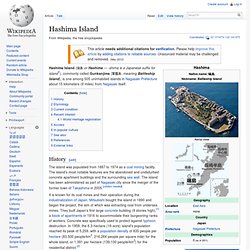
, commonly called Gunkanjima (軍艦島; meaning Battleship Island), is one among 505 uninhabited islands in Nagasaki Prefecture about 15 kilometers (9 miles) from Nagasaki itself. History[edit] It is known for its coal mines and their operation during the industrialization of Japan. Mitsubishi bought the island in 1890 and began the project, the aim of which was extracting coal from undersea mines. As petroleum replaced coal in Japan in the 1960s, coal mines began shutting down all over the country, and Hashima's mines were no exception. Etymology[edit] Perfluorohexane. Let's trim our hair in accordance with the socialist lifestyle. Image from the Let's trim our hair in accordance with the socialist lifestyle television broadcast, showing two acceptable haircuts, modeled by factory workers in the DPRK.

Let's trim our hair in accordance with the socialist lifestyle,[1][2] alternatively translated as Let us trim our hair in accordance with Socialist lifestyle,[3] was part of a North Korean government propaganda campaign promulgating grooming and dress standards in 2004–2005.[3] List of linguistic example sentences. The following is a partial list of linguistic example sentences illustrating various linguistic phenomena.
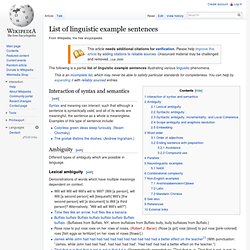
Interaction of syntax and semantics[edit] Syntax and meaning can interact, such that although a sentence is syntactically valid, and all of its words are meaningful, the sentence as a whole is meaningless. Examples of this type of sentence include: Paraprosdokian. A paraprosdokian /pærəprɒsˈdoʊkiən/ is a figure of speech in which the latter part of a sentence or phrase is surprising or unexpected in a way that causes the reader or listener to reframe or reinterpret the first part.
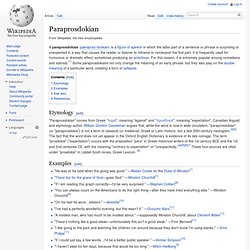
It is frequently used for humorous or dramatic effect, sometimes producing an anticlimax. For this reason, it is extremely popular among comedians and satirists.[1] Some paraprosdokians not only change the meaning of an early phrase, but they also play on the double meaning of a particular word, creating a form of syllepsis. Etymology[edit] "Paraprosdokian" comes from Greek "παρά", meaning "against" and "προσδοκία", meaning "expectation". Examples[edit] Lion-Eating Poet in the Stone Den. The text[edit] An uneaten stone lion.
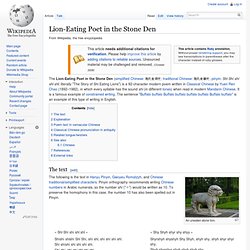
The following is the text in Hanyu Pinyin, Gwoyeu Romatzyh, and Chinese traditional/simplified characters. Pinyin orthography recommends writing Chinese numbers in Arabic numerals, so the number shí ("十") would be written as 10. To preserve the homophony in this case, the number 10 has also been spelled out in Pinyin. Translation: Snap-dragon (game)
The liquid used in Snap-dragon was typically brandy, although similar flammable liquors could also be used.
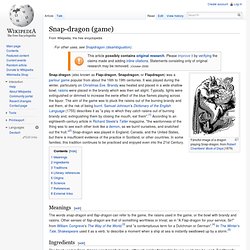
Traditionally, raisins were the treat to be snatched; William Sandys specifies Málaga raisins.[6] Other treats, however, could also be used. Of these, almonds were the most common alternative or addition, but currants, candied fruit, figs, grapes, and plums also featured. Salt could also be sprinkled in the bowl.[7] The low bowl was typically placed in the middle of a table to prevent damage from the inevitable splashes of burning brandy.
In one variation a Christmas pudding is placed in the centre of the bowl with raisins around it. Most sources describe Snap-dragon as a Christmas tradition, however Blain suggests that in the United States it was played at Halloween instead,[7] and Platt notes that There were several other traditions surrounding the game of Snap-dragon. Tupper's self-referential formula. Tupper's self-referential formula is a self-referential formula defined by Jeff Tupper that, when graphed in two dimensions, can visually reproduce the formula itself.
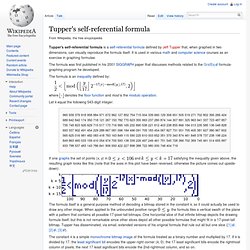
It is used in various math and computer science courses as an exercise in graphing formulae. The formula was first published in his 2001 SIGGRAPH paper that discusses methods related to the GrafEq formula-graphing program he developed. where. Buttstroke. The buttstroke or butt-stroking, i.e., striking someone with the buttstock of a rifle,[1] is a common case of the use of a firearm as a blunt weapon.

Buttstroke is among the major offensive techniques with the rifle and bayonet.[2] The 1918 United States Navy Landing-force Manual describes the following techniques of buttstroking: Buttstroke I - Upward swing: Swing the butt up at the opponent's crotch, ribs, forearm, etc. Bortle Dark-Sky Scale. The Bortle scale is a nine-level numeric scale that measures the night sky's brightness of a particular location.
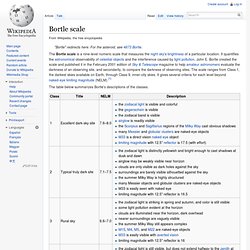
It quantifies the astronomical observability of celestial objects and the interference caused by light pollution. John E. Bortle created the scale and published it in the February 2001 edition of Sky & Telescope magazine to help amateur astronomers evaluate the darkness of an observing site, and secondarily, to compare the darkness of observing sites. The scale ranges from Class 1, the darkest skies available on Earth, through Class 9, inner-city skies. Casper (cat) Finden also received condolences from all over the world, including Australia, Argentina, Indonesia and the United States.[4][15] The Guardian wrote in an editorial entitled "In praise of… Casper the commuting cat": "Casper had a thing about HGVs, but otherwise little road sense.
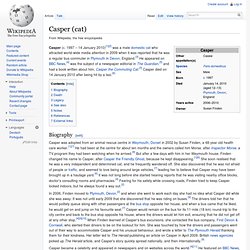
That could have been his undoing. But, all things considered, what a ride it was. "[5] List of films that most frequently use the word "fuck" Yuan Chonghuan. Yuan Chonghuan (Yüan Ch'ung-huan; 6 June 1584 – 22 September 1630), courtesy name Yuánsù (元素) or Zìrú (自如), was a famed patriot and military commander of the Ming Dynasty who battled the Manchus in Liaoning. He was of Cantonese origin.[1] Yuan Chonghuan was known to have excelled in artillery warfare and successfully incorporated Western tactics with those of the East. Yuan's military career reached its height when he defeated Nurhaci and the Manchu army in the first Battle of Ningyuan. Later, Yuan also managed to defeat Nurhaci's son and successor, Huang Taiji, and his 200,000 mostly Mongol soldiers. However, Yuan was eventually tortured and executed by the Chongzhen Emperor under false charges which Huang Taiji was believed to have deliberately planted against him.
Early life[edit] Holographic Versatile Disc. The Holographic Versatile Disc (HVD) is an optical disc technology developed between April 2004 and mid-2008 that can store up to several terabytes of data on an optical disc 10 cm or 12 cm in diameter. The reduced radius reduces cost and materials used. It employs a technique known as collinear holography, whereby a green and red laser beam are collimated in a single beam. List of lists of lists. Some articles that consist of a list of things that are themselves about lists of things, such as the lists of lists listed below. General reference[edit] Culture and the arts[edit]
Murder of Tim McLean. The killing of Tim McLean (October 3, 1985[1] – July 30, 2008) occurred on the evening of July 30, 2008. McLean, a 22-year-old Canadian man, was stabbed, beheaded and cannibalized while riding a Greyhound Canada bus about 30 km west of Portage la Prairie, Manitoba traveling the Trans Canada Highway. On March 5, 2009, McLean's killer, 40-year-old Vince Weiguang Li (simplified Chinese: 李伟光; traditional Chinese: 李偉光; pinyin: Lǐ Wěiguāng) (born April 30, 1968), was found to be not criminally responsible for murder and was remanded to a high-security mental health facility where he currently resides.[2] Bat bomb. Wizards Project. Synopsis[edit] The project defined a "Truth Wizard" as a person identified who can identify deception with accuracy of at least 80%, whereas the average person rates around 50%. Poe's law. Snatiation.
Unusual articles. This page is for Wikipedians to list articles that seem unusual. These articles are valuable contributions to the encyclopedia, but are a bit odd, whimsical, or something you would not expect to find in Encyclopædia Britannica. We should take special care to meet the highest standards of an encyclopedia with these articles lest they make Wikipedia appear idiosyncratic. Geosmin. Petrichor. Petrichor (/ˈpɛtrɨkɔər/) is the earthy scent produced when rain falls on dry soil. London Underground mosquito. The evidence for this mosquito being a different species from C. pipiens comes from research by Kate Byrne and Richard Nichols. Zablon Simintov. Encephalization quotient. This is a more refined measurement than the raw brain-to-body mass ratio, as it takes into account allometric effects.
The relationship, expressed as a formula, has been developed for mammals, and may not yield relevant results when applied outside this group.[6] Isle Royale. Nils Olav. William Windsor (goat) Wojtek (soldier bear) Flâneur. List of countries without armed forces. Charles II of Spain. Chief Mouser to the Cabinet Office. Humphrey (cat) Buck v. Bell. EyeTap. Hugo Award for Best Novel. Language Learning Difficulty for English Speakers. Crustastun. Callipygous. Berners Street Hoax. Dunning–Kruger effect. Fray Tormenta. Kami (Takalani Sesame character) Sequoyah. List of common misconceptions. Keratosis pilaris.